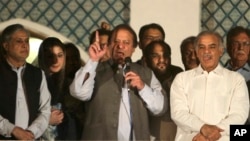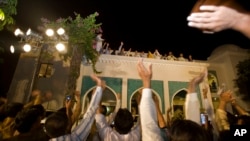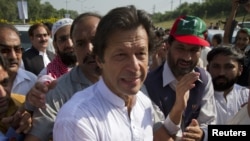PESHAWAR —
Pakistan’s two-time former prime minister Nawaz Sharif’s political party has apparently won Saturday’s historic general elections for the National Assembly, the lower house of parliament, making the veteran politician likely to become the country’s chief executive for a third time. But with no party headed for an outright majority of seats, Sharif will need to form a coalition government.
Election authorities are still compiling results from Saturday’s polls for 272 seats of the National Assembly. But partial vote counts released by official and private TV stations showed a clear lead for Nawaz Sharif’s Pakistan Muslim League or PML-N party. It has also apparently won a clear majority in Punjab province, where 60 percent of Pakistanis live.
Sharif declared victory in a late night speech to a cheering crowd gathered outside his residence in the provincial capital, Lahore.
Sharif said that “results are still coming in, but this much is confirmed that his is the single largest party so far”. He also urged his supporters to pray for his party to win enough seats by Sunday morning enabling it “to form a stable government on its own without needing the crutches of coalition partners”. He promised to work with his political opponents to overcome problems facing Pakistan.
“I appeal to all to come sit with me at the table so that this nation can get rid of this curse of power cuts, inflation and unemployment,” Sharif told the crowd.
In view of the partial vote counts, Sharif is almost certain to become the prime minister for a third time after a gap of nearly 14 years when he was ousted in a military coup in 1999. But most analysts believe the apparently divided mandate is likely to force him to join hands with other parties to form a coalition government.
Former cricket star Imran Khan’s Pakistan Tehreek-e-Insaf party is expected to secure the second position in the national parliament and has emerged is the single largest political force in the provincial legislature of Khyber Pakhtunkhwa province.
Despite unprecedented pre-election violence and attacks on Saturday that killed more than 35 people, election officials say that an exceptionally high number of 86 million eligible voters turned out to cast their votes.
Chief Election Commissioner Fakhruddin Ibrahim told reporters that barring few incidents of alleged irregularities and rigging the electoral process in general was a major success for the entire nation. “Nearly 60 percent people voted, took part in the voting process," he said.
The turnout in the 2008 elections was just 44 percent.
The former ruling Pakistan Peoples Party of President Asif Ali Zardari is expected to grab less than 40 seats, which is a major setback in view of its 124 lawmakers in the previous National Assembly.
Saturday’s vote marked the first time a civilian government in Pakistan has completed its full five year term and transferred power to another through the ballot box. The lack of democracy is blamed on the powerful military that has ruled Pakistan through coups or interventions from behind the scene for nearly half of its existence as an independent country.
Election authorities are still compiling results from Saturday’s polls for 272 seats of the National Assembly. But partial vote counts released by official and private TV stations showed a clear lead for Nawaz Sharif’s Pakistan Muslim League or PML-N party. It has also apparently won a clear majority in Punjab province, where 60 percent of Pakistanis live.
Sharif declared victory in a late night speech to a cheering crowd gathered outside his residence in the provincial capital, Lahore.
Sharif said that “results are still coming in, but this much is confirmed that his is the single largest party so far”. He also urged his supporters to pray for his party to win enough seats by Sunday morning enabling it “to form a stable government on its own without needing the crutches of coalition partners”. He promised to work with his political opponents to overcome problems facing Pakistan.
“I appeal to all to come sit with me at the table so that this nation can get rid of this curse of power cuts, inflation and unemployment,” Sharif told the crowd.
In view of the partial vote counts, Sharif is almost certain to become the prime minister for a third time after a gap of nearly 14 years when he was ousted in a military coup in 1999. But most analysts believe the apparently divided mandate is likely to force him to join hands with other parties to form a coalition government.
Former cricket star Imran Khan’s Pakistan Tehreek-e-Insaf party is expected to secure the second position in the national parliament and has emerged is the single largest political force in the provincial legislature of Khyber Pakhtunkhwa province.
Despite unprecedented pre-election violence and attacks on Saturday that killed more than 35 people, election officials say that an exceptionally high number of 86 million eligible voters turned out to cast their votes.
Chief Election Commissioner Fakhruddin Ibrahim told reporters that barring few incidents of alleged irregularities and rigging the electoral process in general was a major success for the entire nation. “Nearly 60 percent people voted, took part in the voting process," he said.
The turnout in the 2008 elections was just 44 percent.
The former ruling Pakistan Peoples Party of President Asif Ali Zardari is expected to grab less than 40 seats, which is a major setback in view of its 124 lawmakers in the previous National Assembly.
Saturday’s vote marked the first time a civilian government in Pakistan has completed its full five year term and transferred power to another through the ballot box. The lack of democracy is blamed on the powerful military that has ruled Pakistan through coups or interventions from behind the scene for nearly half of its existence as an independent country.






